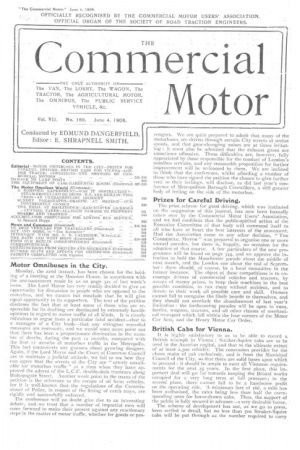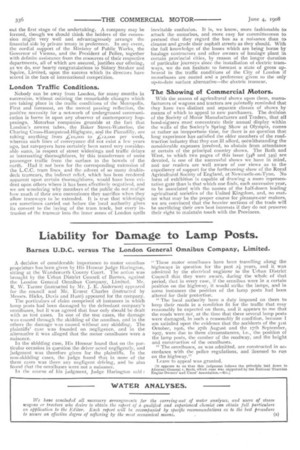Motor Omnibuses in the City.
Page 1

Page 2

If you've noticed an error in this article please click here to report it so we can fix it.
-Monday, the 22nd instant, has been chosen for the holding of a meeting at the Mansion House, in accordance with the announcement made by us on page 321 of last week's issue. The Lord Mayor has very readily decided to give an opportunity for discussion to people who are opposed to the motorbus, and we cannot but conclude that he will give equal opportunity to its supporters. The text of the petition discloses the fact that at least some of those who are responsible for its drafting are dominated by extremely hostile opinions in regard to motor traffic of all kinds. It is clearly ridiculous to argue from a particular fatal accident—that to amanager of a City hank—that any stringent remedial measures are necessary, and we would once more point out that there has been a proportionate diminution in the number of deaths, during the past 12 months, compared with the first 12 months of motorbus traffic in the Metropolis. This fact controverts any guesses about growing dangers. Again, if the Lord Mayor and the Court of Common Council are to maintain a judicial attitude, we fail to see how they can agree that the streets of the City are " utterly unsuitable for motorbus traffic " at a time when they have approved the advent of the L.C.C. double-deck tramcars along Bishopsgate Street. Another weak point in the terms of the 'petition is the reference to the escape of oil from vehicles, for it is well-known that .the regulations of the Commissioner of Police, in respect of the fittim,Y of catch trays, are rigidly and successfully enforced.
The conference-will-no doubt give rise to an interesting debate, and-,we trust that a number of impartial men will come forward to make their, protest against any reactionary steps in the matter of motor traffic, whether for goods or pas sengers. We are quite prepared to admit that many of the motorbuses are driven through certain City streets at undue speeds, and that gear-changing noises are at times irritating : it must also be admitted that the exhaust gases are sometimes offensive. These difficulties are however, fully appreciated by those responsible for the conduct of London's omnibus services, and any reasonable proposition for further improvement will be welcomed by them. We are inclined to think that the conference, whilst affording a number of those who have signed the petition the chance to give further vent to their feelings, will disclose, as did last year's conference of Metropolitan Borough Councillors, -a still greater body of feeling on the side of the motorbus.
Prizes for Careful Driving.
The prize scheme for good driving, which was instituted on the suggestion of this journal, has now been formally taken over by the Commercial Motor Users' Association, and we feel confident that the public-spirited action of the Executive Cornmitte.e of that body will commend itself to all who have at heart the best interests of the movement. Had the Association come to any other decision, " Tns COMMERCIAL MOTOR " was prepared to organise one or more annual parades, but there is, happily, no occasion for the adoption of that course. A few .particulars of the new programme will be found on page 344, and we approve the intention to hold the Manchester parade about the middle of next month, and the London one about the end of September : there should, of course, be a local committee in the former instance. The object of these competitions is to encourage drivers of commercial vehicles and tractors, by means of money prizes, to keep their machines in the best possible condition, to run them without accident, and to devote to their work all possible care and skill. Owners cannot fail to recognise the likely benefit to themselves, and they should not overlook the abandonment of last year's limitation : the forthcoming parades will be open to vans,. lorries, wagons, tractors, and all other classes of rnec.hanical transport which fall within the four corners of the Motor Car ;Nets, and the Heavy Motor Car Order.
British Cabs for Vienna.
It is highly satisfactory to us to be able to record a British triumph. in Vienna : Straker-Squire cabs are to be used in the Austrian caRital, and that to the ultimate extent of at least 2,50o vehicles. The concession provides for the above, make of cab exclusively, and is from the Municipal Council of the City, so that there are solid bases upon which to proceed: it should be ample to meet all Viennese requirements for the next 25 years. In the first place, this important deal will go far towards keeping the Bristol works occupied for a very long term at full pressure; in the second place, there cannot fail to be a handsome profit on the operating side. 'A minimum fare of r6d. a mile has been authorised, the rates being less than half the corresponding ones for horse-drawn cabs. Thus, the. support of the public is fully secured in advance—a very desirable factor.
The scheme of development has not, as we go to press, been settled in detail, but no less than ro Straker-Squire cabs will be put through as the number required to carry
out the first stage of the undertaking. A company may be formed, though we should think the holders of the concession might very well and advantageously arrange the financial side by private treaty in preference. In any event, the cordial support of the Minister of Public Works, the Governor of Vienna, and the President of Police, together with definite assistance from the resources of their respective departments, all of which are assured, justifies our offering, as we do, our hearty congratulations to Sidney Straker and Squire, Limited, upon the success which its directors have scored in the face of international competition,
London Traffic Conditions.
Nobody can be away from London, for many months in succession, without noticing the remarkable changes which are taking place in the traffic conditions of the Metropolis. First and foremost, on the merest passing reflection, the positive necessity for a net-work of underground communication is borne in upon any observer of contemporary happenings. Motorbus companies grumble at the fact that London's newest tubes, the Baker Street-Waterloo, the Charing Cross-Hampstead-Highgate, and the Piccadilly, are taking. anything from .-,to,000 to ,I.2,000 per week, whereas such lines of conveyance did not exist a few years ago, but ratepayers have certainly been saved very considerable sums, in respect of street widenings and traffic delays at intersecting thoroughfares, by this transference of some passenger traffic from the surface to the bowels of the earth. }lad it not been for the corresponding extension of the L.C.C. tram lines, and the advent of so many doubledeck tramcars, the indirect relief, which has been rendered apparent upon certain thoroughfares, would have been evident upon others where it has been effectively negatived, and we are wondering why members of the public do not realise how much of their own convenience they sacrifice when they allow tramways to be extended. It is true that widenings are sometimes carried out before the local authority gives its consent to the laying of the tram track, but every intrusion of the tramcar into the inner zones of London spells inevitable confusion. It is, we know, more fashionable to attack the motorbus, and more easy for committeemen to pretend that they regard the bus as a nuisance than to cleanse and grade their asphalt streets as they should. With the full knowledge of the -losses which are being borne by haulage contractors and other owners of haulage plant in certain provincial cities, by reason of the longer duration of particular journeys since the installation of electric tramways, we do not hesitate to forecast a state of gross up-heaval in the traffic conditions of the City of London if motorbuses are ousted and a preference given to the only up-to-date surface alternative—the electric tramcar.
The Showing of Commercial Motors.
With the season of agricultural shows upon them, manufacturers of wagons and tractors are pointedly reminded that they have two distinct and separate classes of shows by means of which to appeal to new purchasers. The decision of the Society of Motor Manufacturers and Traders, that all bond-signers must concentrate their annual display within the walls of the Society's Spring Show at Olympia, comes at rather an inopportune time, for there is no question that long experience has satisfied the older members of the roadtraction industry that they can ill afford, notwithstanding the considerable expenses involved, to abstain from attendance at certain of the principal country shows. The Bath and West, to which two pages of this issue (348 and 349) are devoted, is one of the successful shows we have in mind, and our readers are well aware of our views as to the expediency of support for the forthcoming show of the Royal Agricultural Society of England, at Newcastle-on-Tyne. No form of exhibition is capable of drawing a more representative gate than is that which one finds, each successive year, to be associated with the names of the half-dozen leading agricultural societies of the United Kingdom, and, no matter what may be the proper course for pleasure-car makers, we are convinced that the heavier sections of the trade will be sacrificing their own best interests if they do not preserve their right to maintain touch with the Provinces.
























